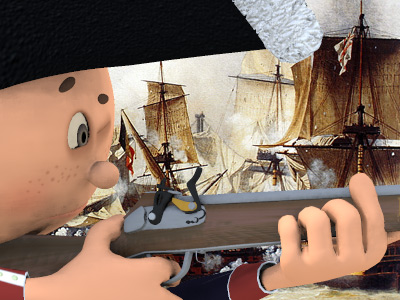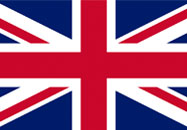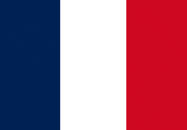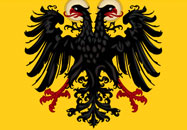Napoleonic Wars (1803-1815)
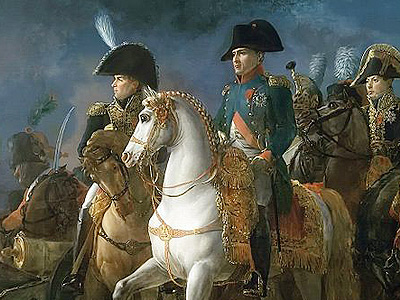
War of the Seventh Coalition 1815
The Seventh Coalition (1815) pitted Britain, Russia, Prussia, Sweden, Switzerland, Austria, the Netherlands and several German states against France. The period known as the Hundred Days began after Napoleon escaped from Elba and landed at Cannes (1 March 1815). Travelling to Paris, picking up support as he went, he eventually overthrew the restored Louis XVIII. The Allies rapidly gathered their armies to meet him again. Napoleon raised 280,000 men, whom he distributed among several armies. To add to the 90,000-strong standing army, he recalled well over a quarter of a million veterans from past campaigns and issued a decree for the eventual draft of around 2.5 million new men into the French army, which was never achieved. This faced an initial coalition force of about 700,000—although coalition campaign plans provided for one million front-line soldiers, supported by around 200,000 garrison, logistics and other auxiliary personnel.
Napoleon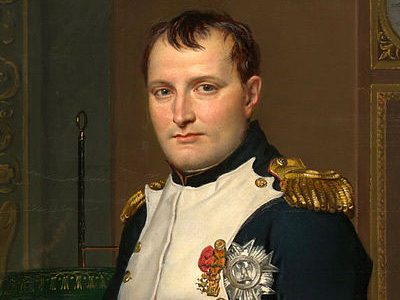 Napoleon Bonaparte (1769-1821), was a French military and political leader who rose to prominence during the French Revolution and led several successful campaigns during the French Revolutionary Wars. As Napoleon I, he was Emperor of the French from 1804 until 1814, and again in 1815. One of the greatest commanders in history, his wars and campaigns are studied at military schools worldwide. Napoleon Bonaparte » took about 124,000 men of the Army of the North on a pre-emptive strike against the Allies in Belgium. He intended to attack the coalition armies before they combined, in hope of driving the British
Napoleon Bonaparte (1769-1821), was a French military and political leader who rose to prominence during the French Revolution and led several successful campaigns during the French Revolutionary Wars. As Napoleon I, he was Emperor of the French from 1804 until 1814, and again in 1815. One of the greatest commanders in history, his wars and campaigns are studied at military schools worldwide. Napoleon Bonaparte » took about 124,000 men of the Army of the North on a pre-emptive strike against the Allies in Belgium. He intended to attack the coalition armies before they combined, in hope of driving the British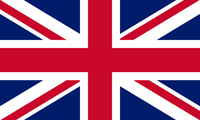 The United Kingdom of Great Britain and Ireland was a sovereign state in Northwestern Europe that comprised the entirety of the British Isles between 1801 and 1922. The United Kingdom, having financed the European coalition that defeated France during the Napoleonic Wars, developed a large Royal Navy that enabled the British Empire to become the foremost world power for the next century. into the sea and the Prussians out of the war. His march to the frontier achieved the surprise he had planned, catching the Anglo-Dutch Army in a dispersed arrangement. The Prussians had been more wary, concentrating 3⁄4 of their army in and around Ligny. The Prussians forced the Armée du Nord to fight all the day of the 15th to reach Ligny in a delaying action by the Prussian 1st Corps. He forced Prussia
The United Kingdom of Great Britain and Ireland was a sovereign state in Northwestern Europe that comprised the entirety of the British Isles between 1801 and 1922. The United Kingdom, having financed the European coalition that defeated France during the Napoleonic Wars, developed a large Royal Navy that enabled the British Empire to become the foremost world power for the next century. into the sea and the Prussians out of the war. His march to the frontier achieved the surprise he had planned, catching the Anglo-Dutch Army in a dispersed arrangement. The Prussians had been more wary, concentrating 3⁄4 of their army in and around Ligny. The Prussians forced the Armée du Nord to fight all the day of the 15th to reach Ligny in a delaying action by the Prussian 1st Corps. He forced Prussia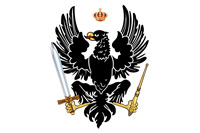 The Kingdom of Prussia was a German kingdom that constituted the state of Prussia between 1701 and 1918. It was the driving force behind the unification of Germany in 1871 and was the leading state of the German Empire until its dissolution in 1918. Although it took its name from the region called Prussia, it was based in the Margraviate of Brandenburg. Its capital was Berlin. to fight at Ligny on 16 June 1815, and the defeated Prussians retreated in disorder. On the same day, the left wing of the Armée du Nord, under the command of Marshal Michel Ney, succeeded in stopping any of Wellington's forces going to aid Blücher's Prussians by fighting a blocking action at Quatre Bras. Ney failed to clear the cross-roads and Wellington reinforced the position. But with the Prussian retreat, Wellington too had to retreat. He fell back to a previously reconnoitred position on an escarpment at Mont St Jean, a few miles south of the village of Waterloo.
The Kingdom of Prussia was a German kingdom that constituted the state of Prussia between 1701 and 1918. It was the driving force behind the unification of Germany in 1871 and was the leading state of the German Empire until its dissolution in 1918. Although it took its name from the region called Prussia, it was based in the Margraviate of Brandenburg. Its capital was Berlin. to fight at Ligny on 16 June 1815, and the defeated Prussians retreated in disorder. On the same day, the left wing of the Armée du Nord, under the command of Marshal Michel Ney, succeeded in stopping any of Wellington's forces going to aid Blücher's Prussians by fighting a blocking action at Quatre Bras. Ney failed to clear the cross-roads and Wellington reinforced the position. But with the Prussian retreat, Wellington too had to retreat. He fell back to a previously reconnoitred position on an escarpment at Mont St Jean, a few miles south of the village of Waterloo.
Napoleon took the reserve of the Army of the North, and reunited his forces with those of Ney to pursue Wellington's army, after he ordered Marshal Grouchy to take the right wing of the Army of the North and stop the Prussians re-grouping. In the first of a series of miscalculations, both Grouchy and Napoleon failed to realise that the Prussian forces were already reorganised and were assembling at the village of Wavre. The French army did nothing to stop a rather leisurely retreat that took place throughout the night and into the early morning by the Prussians. As the 4th, 1st, and 2nd Prussian Corps marched through the town towards Waterloo the 3rd Prussian Corps took up blocking positions across the river, and although Grouchy engaged and defeated the Prussian rearguard under the command of Lt-Gen von Thielmann in the Battle of Wavre (18–19 June) it was 12 hours too late. In the end, 17,000 Prussians had kept 33,000 badly needed French reinforcements off the field.
Napoleon delayed the start of fighting at the Battle of Waterloo on the morning of 18 June for several hours while he waited for the ground to dry after the previous night's rain. By late afternoon, the French army had not succeeded in driving Wellington's forces from the escarpment on which they stood. When the Prussians arrived and attacked the French right flank in ever-increasing numbers, Napoleon's strategy of keeping the coalition armies divided had failed and a combined coalition general advance drove his army from the field in confusion.

Map of the Waterloo campaign
Grouchy organised a successful and well-ordered retreat towards Paris, where Marshal Davout had 117,000 men ready to turn back the 116,000 men of Blücher and Wellington. Davout was defeated at the Battle of Issy and negotiations for surrender had begun.
On arriving at Paris three days after Waterloo, Napoleon still clung to the hope of a concerted national resistance; but the temper of the legislative chambers, and of the public generally, did not favour his view. Lacking support Napoleon abdicated again on 22 June 1815 and on 15 July, surrendered to the British squadron at Rochefort. The Allies exiled him to the remote South Atlantic island of Saint Helena, where he died on 5 May 1821.
In Italy, Joachim Murat, whom the Allies had allowed to remain King of Naples after Napoleon's initial defeat, once again allied with his brother-in-law, triggering the Neapolitan War (March to May 1815). Hoping to find support among Italian nationalists fearing the increasing influence of the Habsburgs in Italy, Murat issued the Rimini Proclamation inciting them to war. The proclamation failed and the Austrians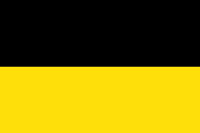 Austrian Empire was a Central-Eastern European and multinational great power from 1804 to 1867, created by proclamation out of the realms of the Habsburgs. During its existence, it was the third most populous monarchy in Europe after the Russian Empire and the United Kingdom. Along with Prussia, it was one of the two major powers of the German Confederation. The empire was proclaimed by Francis II in 1804 in response to Napoleon's declaration of the First French Empire. soon crushed Murat at the Battle of Tolentino (2 May to 3 May 1815), forcing him to flee. The Bourbons returned to the throne of Naples on 20 May 1815. Murat tried to regain his throne, but after that failed, he was executed by firing squad on 13 October 1815.
Austrian Empire was a Central-Eastern European and multinational great power from 1804 to 1867, created by proclamation out of the realms of the Habsburgs. During its existence, it was the third most populous monarchy in Europe after the Russian Empire and the United Kingdom. Along with Prussia, it was one of the two major powers of the German Confederation. The empire was proclaimed by Francis II in 1804 in response to Napoleon's declaration of the First French Empire. soon crushed Murat at the Battle of Tolentino (2 May to 3 May 1815), forcing him to flee. The Bourbons returned to the throne of Naples on 20 May 1815. Murat tried to regain his throne, but after that failed, he was executed by firing squad on 13 October 1815.
HISTORY
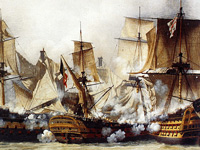
RESOURCES
This article uses material from the Wikipedia article "Napoleonic Wars", which is released under the Creative Commons Attribution-Share-Alike License 3.0.
© Stories Preschool. All Rights Reserved.
